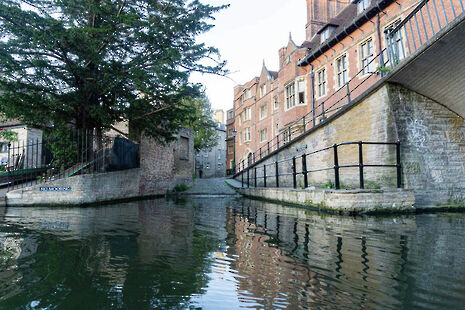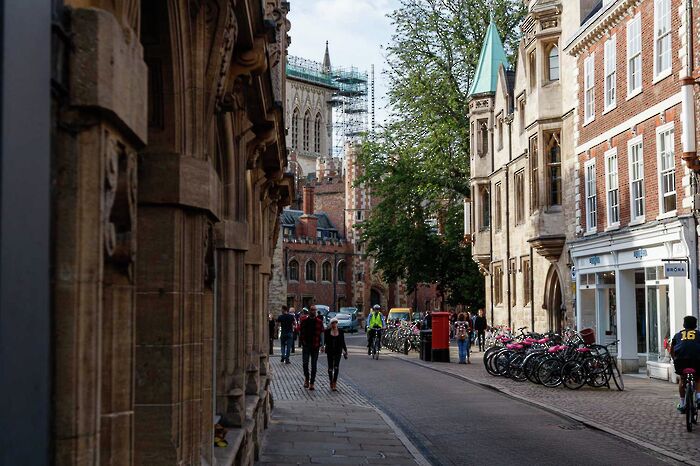Reclaiming my time for myself
These past months, I’ve tried to detach myself from a mentality of hyperproductivity that Cambridge encourages, writes Anya Gera in her Letter to Freshers

At around 1.30am one night during exam term, I snapped out of my semi-hypnotic state of throwing together essay plan after essay plan to survey my surroundings. Despite the silence and dim lighting that made it feel empty, the library was almost full. Around me were students unaware of the hour, or frankly even the day of the year. There was an almost Black Mirror-esque, dead-behind-the-eyes look on their faces as they stared fixedly at their screens. I knew that many of these people would be in these spots hours after I had left, and would arrive the next morning hours before I would. It was somewhat perturbing.
Why were we all doing this? And how? Was it the austere scholars peering down at us from the paintings on the wall, flaunting their academic successes we strive for? When did these students, whose presence in the library seemed so unchanging, do everything else that you get done in your daily life? These questions were the beginning of my exploration of time at Cambridge: how it seems to run at a different pace during these excruciatingly brief terms, and how we grapple with it.
What would you say to your fresher self?
Write for Varsity's annual series, Letters to Freshers. Just email our Features team with a 150-word pitch with a story to tell about your time at Cambridge.
Studying a course like HSPS, where our knowledge and skills are scattered around up to four subjects can lead us to suffer from a severe ‘jack of all trades, master of none’ complex. What have I really come out of first year with, other than debt and a patchy and deeply unscientific knowledge of the contents of Psychology for Dummies? After some deliberation, admittedly laced with a need to positively affirm what I was doing, I realised that there is one thing that all Cambridge students are experts of: time management. I did not, however, expect my year at university to restructure my relationship with time and the activities I chose to fill it with.
Being even somewhat successful at Cambridge requires a meticulous and rigorous compartmentalisation of time. Not only are we operating under constant pressure to churn out lengthy and highly researched pieces of work at much too frequent intervals, but the ‘Cambridge way’ means that on top of this most are juggling at least one other serious extra-curricular activity. Between this, doing all household necessities, making sure you’re eating and sleeping in a somewhat sustainable way and still have a social life, each task must have an allocated time slot. We have all heard the woes of a strung-out Cambridge student: this mentality of overwork had become so ingrained in my mind that even with summer underway, it took a great deal of effort to detach my daily habits from these hyproductive rhythms.
Cambridge keeps us hooked on the ‘mini wins,’ the small dopamine hits we get as we crunch through a 20 point to-do list
A week into the summer holidays it became very apparent to me that I wasn’t able to relax fully. With exams done and May Week over, I was fortunate enough that my return home marked an opportunity to finally have some down time. However, activities that I had consumed myself with the summer before I started Cambridge — reading books for pleasure, walking my dog or simply an afternoon in the garden with friends — left me feeling restless and unproductive. It was these activities that I had, paradoxically spent my entire exam term glorifying and the fact they weren’t giving me the happiness I had envisioned they would confused me.
It was only in light of discussions of the value of my degree did I realise that my thought pattern appeared to almost be restructured into only valuing tangible outputs. While those eight weeks at Cambridge are some of our most intense and tiring, we all get through it on a productivity high. Whether it’s physically holding a 2,000-word essay that you have just bashed out during an all-nighter, lugging around a ludicrously heavy folder of alphabetically organised lecture notes or churning out a play from first rehearsal to last performance in under three weeks, Cambridge keeps us hooked on the ‘mini wins,’ the small dopamine hits we get as we crunch through a twenty point ‘to-do’ list in a day. But this is not a sustainable reality.
After periods of intense study, we all need a break: curbing “goal directed activity” for a sustained period of time significantly reduces cortisol levels, your body’s main stress hormone. So, I wanted to take this summer to reclaim my time as my own.
First, I dropped the to-do lists for a while. Taking a few weeks away from having daily boxes to check meant I wasn’t just trying to complete activities as quickly as I could for the sake of ticking them off a list. I’ve also been under-caffeinating. Halving my caffeine intake meant that I didn’t have this intense buzz which helped me concentrate on the more mellow activities. While I haven’t been entirely successful in my attempt to temporarily remove the feeling of constantly needing to produce tangible results (this article is an example of that), I feel that I have been able to reclaim at least some of my former laziness, which, it turns out, is a quality that can be missed.
Of course, as term is edging closer, both of these habits are starting to return to my daily life — though hopefully, in smaller and more controlled quantities. I hope that armed with this new-found knowledge that when I return to Cambridge I will be able to recognise when I am simply doing for the sake of just getting it done. Productivity is undoubtedly crucial to existence in Cambridge, and checking off boxes on a to-do list can be weirdly satisfying. But don’t let it consume you, either. Enjoy your time here: give yourself a sense of ownership over your time.
 News / Judge Business School advisor resigns over Epstein and Andrew links18 February 2026
News / Judge Business School advisor resigns over Epstein and Andrew links18 February 2026 News / Gov grants £36m to Cambridge supercomputer17 February 2026
News / Gov grants £36m to Cambridge supercomputer17 February 2026 News / CUCA members attend Reform rally in London20 February 2026
News / CUCA members attend Reform rally in London20 February 2026 News / Union speakers condemn ‘hateful’ Katie Hopkins speech14 February 2026
News / Union speakers condemn ‘hateful’ Katie Hopkins speech14 February 2026 News / Hundreds of Cambridge academics demand vote on fate of vet course20 February 2026
News / Hundreds of Cambridge academics demand vote on fate of vet course20 February 2026










